ASP.NET中进行消息处理(MSMQ) 三
在本文的前两篇文章里对MSMQ的相关知识点进行了介绍,很多阅读过这前两篇文章的朋友都曾问到过这样一些问题:
1、如何把MSMQ应用到实际的项目中去呢?
2、可不可以介绍一个实际的应用实例?
3、......
在前两篇文章里,关于MSMQ常用的技术点基本介绍完毕了,本文主要以MS开源项目PetShop中的MSMQ应用作为案例来介绍MSMQ在实际项目中的应用。在PetShop里,由于系统使用了多线程的专用应用程序来监控消息队列,在进入PetShop应用分析前,我们先来了解下关于多线程和MSMQ的相关知识点。
一、多线程和MSMQ
现在有这样一个需求,指定的消息队列里不管有无消息数据,我们通过一个多线程来监控这个队列,一但队列里的数据发生变化就做出相应的处理,比如把消息读取出来。根据这个需求,我们来做个示例,用一多线程把队列监控起来,如果队列里有消息数据,就把消息读取出来,如果没有则一直监视队列,当队列数据发生改变(有新的消息加入)的时候就作出处理(读取消息)。
首先定义一个线程数组用于存储线程数;
 static private int ThreadNumber = 5; //5个线程序
static private int ThreadNumber = 5; //5个线程序2
 static private Thread[] ThreadArray = new Thread[ThreadNumber];
static private Thread[] ThreadArray = new Thread[ThreadNumber];我们把需要启动的线程装载入ThreadArray数组,通过一个遍历数组把所以的线程启动,实际这里只有5个线程。
 private void button1_Click(object sender, EventArgs e)
private void button1_Click(object sender, EventArgs e)2
 {
{3
 StartThreads();
StartThreads();4
 }
}5

6
 private void StartThreads()
private void StartThreads()7
 {
{8
 int counter; //线程计数
int counter; //线程计数9
 for (counter = 0; counter < ThreadNumber; counter++)
for (counter = 0; counter < ThreadNumber; counter++)10
 {
{11
 ThreadArray[counter] = new Thread(new ThreadStart(MSMQListen));
ThreadArray[counter] = new Thread(new ThreadStart(MSMQListen));12
 ThreadArray[counter].Start();
ThreadArray[counter].Start();13
 this.richTextBox2.Text += (counter + 1).ToString() + "号线程开始!";
this.richTextBox2.Text += (counter + 1).ToString() + "号线程开始!";14
 }
}15
 }
}16

17
 private void MSMQListen()
private void MSMQListen()18
 {
{19
 while (true)
while (true)20
 {
{21
 //取出队列里的消息
//取出队列里的消息22
 MessageBox.Show(MsgQueue.ReceiveMessage());
MessageBox.Show(MsgQueue.ReceiveMessage());23
 }
}24
 }
}
如果上面这段代码阅读起存在问题,建议先去了解下多线程的相关知识点。在StartThreads方法里启动数组里存储的所以线程,并委托给MSMQListen方法进行处理,MSMQListen方法完成的就是读取队列里的消息,这里我使用了在第二篇文章里所使用的MsgQueue类和Book类,详细请阅读第二篇文章ASP.NET中进行消息处理(MSMQ) 二 。
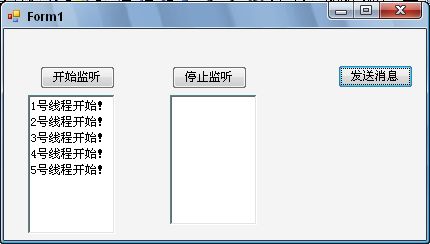
启动了5个线程,用来监视指定的消息队列,如上图。那好,我们现在就来测试一下,通过给队列里发送消息,看线程是否会有响应。从上面启动线程的代码上可以很清晰的看出,只要队列里有消息在多线程的监视下,线程就会把队列里的消息读取出来。
 private void button3_Click(object sender, EventArgs e)
private void button3_Click(object sender, EventArgs e)2
 {
{3
 Book book = new Book();
Book book = new Book();4
 book.BookId = 1;
book.BookId = 1;5
 book.BookName = "asp.net";
book.BookName = "asp.net";6
 book.BookAuthor = "abcd";
book.BookAuthor = "abcd";7
 book.BookPrice = 50.80;
book.BookPrice = 50.80;8

9
 MsgQueue.SendMessage(book);
MsgQueue.SendMessage(book);10
 }
}
那么这里的测试,向队列里发送了一Book对象消息,根据上面分析,则多线程便会同时把此条消息读取出来:

呵呵,测试结果出来,看来此测试达到了我们之前所提出的需求。![]() !OK,关于MSMQ和多线程就简单介绍于此。
!OK,关于MSMQ和多线程就简单介绍于此。
二、MSMQ在开塬项目PetShop中的应用分析。
在PetShop 4.0中,利用消息队列临时存放要插入的数据,来避免因为频繁访问数据库的操作。而队列中的消息,则等待系统的专用的应用程序来处理,最后将数据插入到数据库中。
PetShop 4.0中的消息处理,主要分为下面几大部分:订单策略接口IOrderStategy、消息接口IMessageing、消息工厂MessageFactory、MSMQ实现MSMQMessaging、后台处理应用程序OrderProessor。如下图:
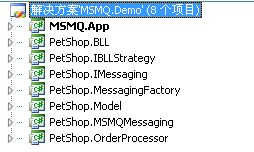
1、订单策略接口IOrderStategy
PetShop 4.0的体系结构是非常庞大,在订单处理上有两种处理策略,这里也是策略模式的一个应用,IOrderStrategy接口作为订单策略的高层抽象,实现不同订单处理的具体策略去实现它,UML如下:
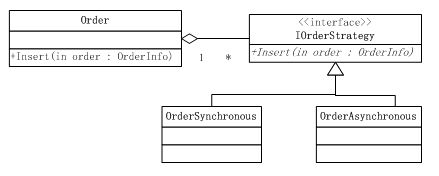
示意性代码:
 namespace PetShop.IBLLStrategy
namespace PetShop.IBLLStrategy2
 {
{3
 public interface IOrderStrategy
public interface IOrderStrategy4
 {
{5
 void Insert(OrderInfo order);
void Insert(OrderInfo order);6
 }
}7
 }
}8

9
 namespace PetShop.BLL
namespace PetShop.BLL10
 {
{11
 public class OrderSynchronous:IOrderStrategy
public class OrderSynchronous:IOrderStrategy12
 {
{13
 private static readonly IOrder asynchOrder = QueueAccess.CreateOrder();
private static readonly IOrder asynchOrder = QueueAccess.CreateOrder();14

15
 public void Insert(OrderInfo order)
public void Insert(OrderInfo order)16
 {
{17
 asynchOrder.Send(order);
asynchOrder.Send(order);18
 }
}19
 }
}20
 }
}21

22
 //
//

从上面UML和代码就可以看出,订单策略接口下有两种实现,使用了抽象工厂模式来完成相应的订单策略对象的创建 。关于这点在后面消息工厂部分去介绍,这里不作讲解。
2、消息接口IMessageing
在PetShop 4.0中,由于对订单处理使用了异步处理方式,在消息接口中仅定义了一个IOrder接口。IOrder接口的定义与MSMQ的实现是一致的,需要提供发送和接收操作。在Send方法中,参数为数据访问层的数据实体对象(OrderInfo),具体的实现则是用MSMQ的实现类(PetShop.MSMQMessaging.Order)去完成的。
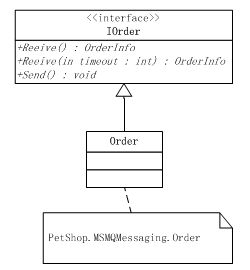
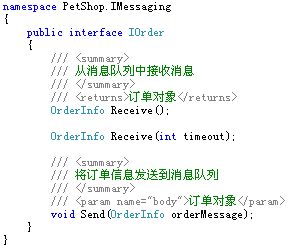
MS的开发人员真的是什么都能想到,在消息接口的实现上考虑得很全面,为了避免将来的扩展会有其他的数据对象也使用到MSMQ;因此,在PetShop 4.0中的消息接口实现中,定义了一个队列的基类(PetShopQueue),实现了消息的发送(Send)和接收(Receive)方法的基本操作。代码如下:
 namespace PetShop.MSMQMessaging
namespace PetShop.MSMQMessaging2
 {
{3
 public class PetShopQueue:IDisposable
public class PetShopQueue:IDisposable4
 {
{5
 //指定消息队列事务的类型
//指定消息队列事务的类型6
 protected MessageQueueTransactionType transactionType = MessageQueueTransactionType.Automatic;
protected MessageQueueTransactionType transactionType = MessageQueueTransactionType.Automatic;7
 protected MessageQueue queue; //消息队列
protected MessageQueue queue; //消息队列8
 protected TimeSpan timeout; //时间间隔
protected TimeSpan timeout; //时间间隔9

10
 public PetShopQueue(string queuePath, int timeoutSeconds)
public PetShopQueue(string queuePath, int timeoutSeconds)11
 {
{12
 queue = new MessageQueue(queuePath); //根据传入quueuPath创建队列
queue = new MessageQueue(queuePath); //根据传入quueuPath创建队列13
 timeout = TimeSpan.FromSeconds(Convert.ToDouble(timeoutSeconds));
timeout = TimeSpan.FromSeconds(Convert.ToDouble(timeoutSeconds));14

15
 queue.DefaultPropertiesToSend.AttachSenderId = false;
queue.DefaultPropertiesToSend.AttachSenderId = false;16
 queue.DefaultPropertiesToSend.UseAuthentication = false;
queue.DefaultPropertiesToSend.UseAuthentication = false;17
 queue.DefaultPropertiesToSend.UseEncryption = false;
queue.DefaultPropertiesToSend.UseEncryption = false;18
 queue.DefaultPropertiesToSend.AcknowledgeType = AcknowledgeTypes.None;
queue.DefaultPropertiesToSend.AcknowledgeType = AcknowledgeTypes.None;19
 queue.DefaultPropertiesToSend.UseJournalQueue = false;
queue.DefaultPropertiesToSend.UseJournalQueue = false;20
 }
}21

22
 /// <summary>
/// <summary>23
 /// 接收消息方法
/// 接收消息方法24
 /// </summary>
/// </summary>25
 public virtual object Receive()
public virtual object Receive()26
 {
{27
 try
try28
 {
{29
 using (Message message = queue.Receive(timeout, transactionType))
using (Message message = queue.Receive(timeout, transactionType))30
 return message;
return message;31
 }
}32
 catch (MessageQueueException mqex)
catch (MessageQueueException mqex)33
 {
{34
 if (mqex.MessageQueueErrorCode == MessageQueueErrorCode.IOTimeout)
if (mqex.MessageQueueErrorCode == MessageQueueErrorCode.IOTimeout)35
 throw new TimeoutException();
throw new TimeoutException();36
 throw;
throw;37
 }
}38
 }
}39

40
 /// <summary>
/// <summary>41
 /// 发送消息
/// 发送消息42
 /// </summary>
/// </summary>43
 public virtual void Send(object msg)
public virtual void Send(object msg)44
 {
{45
 queue.Send(msg, transactionType);
queue.Send(msg, transactionType);46
 }
}47

48
 #region IDisposable 成员
#region IDisposable 成员49
 public void Dispose()
public void Dispose()50
 {
{51
 queue.Dispose(); //解放资源
queue.Dispose(); //解放资源52
 }
}53
 #endregion
#endregion54
 }
}55
 }
}
MSMQ队列是一个可持久的队列,不会因用户不间断的下订单导致数据丢失。queue作为存放数据的队列,为消息队列(MessageQueue)类型,同时还为PetShopQueue设置了timeout值,后台处理应用程序(OrderProessor)会根据timeout的值定期扫描队列中的订单数量。
3、消息工厂MessageFactory
可能是考虑到IOrder的实现会改变不同的策略吧,在PetShop里利用了抽象工厂模式,将IOrder对象的创建用了专门的工厂模块(MessageFactory)进行封装,定义如下:
 namespace PetShop.MessagingFactory
namespace PetShop.MessagingFactory2
 {
{3
 /// <summary>
/// <summary>4
 /// This class is implemented following the Abstract Factory pattern to create the Order
/// This class is implemented following the Abstract Factory pattern to create the Order5
 /// Messaging implementation specified from the configuration file
/// Messaging implementation specified from the configuration file6
 /// </summary>
/// </summary>7
 public sealed class QueueAccess
public sealed class QueueAccess8
 {
{9
 //<add key="OrderMessaging" value="PetShop.MSMQMessaging"/>
//<add key="OrderMessaging" value="PetShop.MSMQMessaging"/>10
 private static readonly string path = "PetShop.MSMQMessaging";
private static readonly string path = "PetShop.MSMQMessaging";11

12
 /// <summary>
/// <summary>13
 /// 私有构造器,防止使用new创建对象实例
/// 私有构造器,防止使用new创建对象实例14
 /// </summary>
/// </summary>15
 private QueueAccess()
private QueueAccess()16
 { }
{ }17

18
 public static IOrder CreateOrder()
public static IOrder CreateOrder()19
 {
{20
 string className = path + ".Order";
string className = path + ".Order";21
 return (IOrder)Assembly.Load(path).CreateInstance(className);
return (IOrder)Assembly.Load(path).CreateInstance(className);22
 }
}23
 }
}24
 }
}
在QueueAccess类中,通过CreateOrder方法利用反射技术创建正确IOrder类型对象(实际也就是创建了一个接口的具体实现类的对象,应用了多态的原理和反射技术)。UML图下:

在PetShop4.0中,消息接口的具体实现是通过配置文件定义在web.config里:
 <add key="OrderMessaging" value="PetShop.MSMQMessaging"/>
<add key="OrderMessaging" value="PetShop.MSMQMessaging"/>这里我为了能够更直观的演示和介绍就把path固化定义了,如下:
 private static readonly string path = "PetShop.MSMQMessaging";
private static readonly string path = "PetShop.MSMQMessaging";这里利用工厂模式来负责对象的创建,主要是方便业务逻辑层对定单处理策略的调用,如在PetShop.BLL模块中的OrderSynchronous类:
 namespace PetShop.BLL
namespace PetShop.BLL2
 {
{3
 public class OrderSynchronous:IOrderStrategy
public class OrderSynchronous:IOrderStrategy4
 {
{5
 private static readonly IOrder asynchOrder = QueueAccess.CreateOrder();
private static readonly IOrder asynchOrder = QueueAccess.CreateOrder();6

7
 public void Insert(OrderInfo order)
public void Insert(OrderInfo order)8
 {
{9
 asynchOrder.Send(order);
asynchOrder.Send(order);10
 }
}11
 }
}12
 }
}
这样一但IOrder接口的实现发生了变化,此时就只需要修改配置文件就OK,整个系统就显得很灵活,稳定。
4、MSMQ实现MSMQMessaging
在PetShop.MSMQMessaging模块中,订单对象实现了消息接口(IMessaging)模块中的IOrder,同时还继承了基类PetShopQueue。定义如下:
 namespace PetShop.MSMQMessaging
namespace PetShop.MSMQMessaging2
 {
{3
 public class Order:PetShopQueue,IOrder
public class Order:PetShopQueue,IOrder4
 {
{5
 private static readonly string queuePath = ConfigurationManager.AppSettings["OrderQueuePath"];
private static readonly string queuePath = ConfigurationManager.AppSettings["OrderQueuePath"];6
 private static int queueTimeout = 20; //20秒为超时
private static int queueTimeout = 20; //20秒为超时7

8
 public Order()
public Order()9
 : base(queuePath, queueTimeout)
: base(queuePath, queueTimeout)10
 {
{11
 queue.Formatter = new BinaryMessageFormatter();
queue.Formatter = new BinaryMessageFormatter();12
 Console.WriteLine(queuePath);
Console.WriteLine(queuePath);13
 }
}14

15
 public new OrderInfo Receive()
public new OrderInfo Receive()16
 {
{17
 //该方法会应用在分布式事务中,故而设置为Automatic的事务类型。
//该方法会应用在分布式事务中,故而设置为Automatic的事务类型。18
 base.transactionType = MessageQueueTransactionType.Automatic;
base.transactionType = MessageQueueTransactionType.Automatic;19
 return (OrderInfo)((Message)base.Receive()).Body;
return (OrderInfo)((Message)base.Receive()).Body;20
 }
}21

22
 public OrderInfo Receive(int timeout)
public OrderInfo Receive(int timeout)23
 {
{24
 base.timeout = TimeSpan.FromSeconds(Convert.ToDouble(timeout));
base.timeout = TimeSpan.FromSeconds(Convert.ToDouble(timeout));25
 return Receive();
return Receive();26
 }
}27

28
 /// <summary>
/// <summary>29
 /// 异步发送定单到消息队列
/// 异步发送定单到消息队列30
 /// </summary>
/// </summary>31
 /// <param name="orderMessage"></param>
/// <param name="orderMessage"></param>32
 public void Send(OrderInfo orderMessage)
public void Send(OrderInfo orderMessage)33
 {
{34
 //该方法不会用于分布式事务中,故而设置为Single的事务类型。
//该方法不会用于分布式事务中,故而设置为Single的事务类型。35
 base.transactionType = MessageQueueTransactionType.Single;
base.transactionType = MessageQueueTransactionType.Single;36
 base.Send(orderMessage);
base.Send(orderMessage);37
 }
}38
 }
}39
 }
}
UML草图:
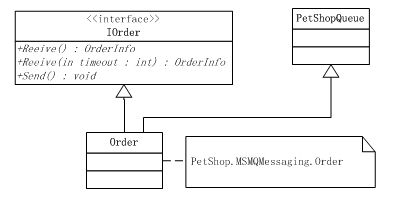
这里需要注意的是,Order类既继承了基类PetShopQueue,同时还实现了接口IOrder,而在消息接口和基类中所定义的接收消息(Receive)方法在方法的签名上是相同的。所以在Order的Receive方法实现中,必须使用new而非override关键字来重写父类PetShopQueue的Receive虚方法。此时Order类的Receive方法代表两个含义,一是实现了消息接口IOrder中的Receive方法;二则是利用了new关键字重写了父类PetShopQueue的Receive虚方法。
在PetShop4.0中,将面向对象的知识点应用得非常精妙,如上分析,此时我门可以怎么来调用Order呢?是这样吗?
 //1、使用基类PetShopQueue
//1、使用基类PetShopQueue2
 PetShopQueue order = new Order();
PetShopQueue order = new Order();3
 order.Receive();
order.Receive();4

5
 //2、使用消息接口IOrder
//2、使用消息接口IOrder6
 IOrder order = new Order();
IOrder order = new Order();7
 order.Receive();
order.Receive();
根据多态原理,上面这两种实现都是正确的,那我们那取谁舍谁呢?在PetShop4.0中正确的调用是第2种方法,这种调用方法也更符合“面向接口设计”的原则。----详细请查看消息工厂MessageFactory部分的介绍。
5、后台处理应用程序OrderProessor
前面一系列的操作,最终都会走向到这里,这里实现了最终的插入数据库的操作。在PetShop 4.0中OrderProessor是一个控制台应用程序,根据需求也可以将其设计为Windows Service。他完成的操作就是接收消息队列里的订单数据,将其插入到数据库。在OrderProessor里使用了多线程技术,监视队列里的订单信息,定期的将其处理。在主方法Main方法中用于控制线程序,核心的执行任何则委托给ProcessOrders方法去实现。
 private static void ProcessOrders()
private static void ProcessOrders()2
 {
{3
 TimeSpan tsTimeout = TimeSpan.FromSeconds(Convert.ToDouble(transactionTimeout * batchSize));
TimeSpan tsTimeout = TimeSpan.FromSeconds(Convert.ToDouble(transactionTimeout * batchSize));4
 Order order = new Order(); //逻辑层的PetShop.BLL.Order
Order order = new Order(); //逻辑层的PetShop.BLL.Order5
 while (true)
while (true)6
 {
{7
 TimeSpan datatimeStarting = new TimeSpan(DateTime.Now.Ticks);
TimeSpan datatimeStarting = new TimeSpan(DateTime.Now.Ticks);8
 double elapsedTime = 0;
double elapsedTime = 0;9

10
 int processedItems = 0;
int processedItems = 0;11
 ArrayList queueOrders = new ArrayList();
ArrayList queueOrders = new ArrayList();12

13
 //首先验证事务
//首先验证事务14
 using (TransactionScope ts = new TransactionScope(TransactionScopeOption.Required, tsTimeout))
using (TransactionScope ts = new TransactionScope(TransactionScopeOption.Required, tsTimeout))15
 {
{16
 //从队列中检索订单
//从队列中检索订单17
 for (int i = 0; i < batchSize; i++)
for (int i = 0; i < batchSize; i++)18
 {
{19
 try
try20
 {
{21
 //在一定时间 类接收队列的订单
//在一定时间 类接收队列的订单22
 if ((elapsedTime + queueTimeout + transactionTimeout) < tsTimeout.TotalSeconds)
if ((elapsedTime + queueTimeout + transactionTimeout) < tsTimeout.TotalSeconds)23
 {
{24
 queueOrders.Add(order.ReceiveFromQueue(queueTimeout));
queueOrders.Add(order.ReceiveFromQueue(queueTimeout));25
 }
}26
 else
else27
 {
{28
 i = batchSize; // 结束循环
i = batchSize; // 结束循环29
 }
}30
 elapsedTime = new TimeSpan(DateTime.Now.Ticks).TotalSeconds - datatimeStarting.TotalSeconds;
elapsedTime = new TimeSpan(DateTime.Now.Ticks).TotalSeconds - datatimeStarting.TotalSeconds;31
 }
}32
 catch (TimeoutException)
catch (TimeoutException)33
 {
{34
 //没有可以等待的消息也结束循环
//没有可以等待的消息也结束循环35
 i = batchSize;
i = batchSize;36
 }
}37
 }
}38

39
 //处理队列的订单
//处理队列的订单40
 for (int k = 0; k < queueOrders.Count; k++)
for (int k = 0; k < queueOrders.Count; k++)41
 {
{42
 order.Insert((OrderInfo)queueOrders[k]);
order.Insert((OrderInfo)queueOrders[k]);43
 processedItems++;
processedItems++;44
 totalOrdersProcessed++;
totalOrdersProcessed++;45
 }
}46
 //处理完毕或者是超时
//处理完毕或者是超时47
 ts.Complete();
ts.Complete();48
 }
}49
 Console.WriteLine("(Thread Id " + Thread.CurrentThread.ManagedThreadId + ") batch finished, " + processedItems + " items, in " + elapsedTime.ToString() + " seconds.");
Console.WriteLine("(Thread Id " + Thread.CurrentThread.ManagedThreadId + ") batch finished, " + processedItems + " items, in " + elapsedTime.ToString() + " seconds.");50
 }
}51
 }
}
ProcessOrders方法首先通过业务逻辑层PetShop.BLL.Order类的方法ReceiveFromQueue去获取消息队列中的订单数据,并将其放入一个ArrayList对象,然后将其插入到数据库。 OrderProcessor的完整代码定义如下:
1
 using System;
using System;2
 using System.Collections.Generic;
using System.Collections.Generic;3
 using System.Text;
using System.Text;4
 using System.Configuration;
using System.Configuration;5
 using System.Threading;
using System.Threading;6
 using PetShop.BLL;
using PetShop.BLL;7
 using System.Collections;
using System.Collections;8
 using System.Transactions;
using System.Transactions;9
 using PetShop.Model;
using PetShop.Model;10

11
 namespace PetShop.OrderProcessor
namespace PetShop.OrderProcessor12
 {
{13
 class Program
class Program14
 {
{15
 private static int transactionTimeout = int.Parse(ConfigurationManager.AppSettings["TransactionTimeout"]);
private static int transactionTimeout = int.Parse(ConfigurationManager.AppSettings["TransactionTimeout"]);16
 private static int queueTimeout = int.Parse(ConfigurationManager.AppSettings["QueueTimeout"]);
private static int queueTimeout = int.Parse(ConfigurationManager.AppSettings["QueueTimeout"]);17
 private static int batchSize = int.Parse(ConfigurationManager.AppSettings["BatchSize"]);
private static int batchSize = int.Parse(ConfigurationManager.AppSettings["BatchSize"]);18
 private static int threadCount = int.Parse(ConfigurationManager.AppSettings["ThreadCount"]);
private static int threadCount = int.Parse(ConfigurationManager.AppSettings["ThreadCount"]);19
 private static int totalOrdersProcessed = 0;
private static int totalOrdersProcessed = 0;20

21
 static void Main(string[] args)
static void Main(string[] args)22
 {
{23
 Thread workTicketThread;
Thread workTicketThread;24
 Thread[] workerThreads = new Thread[threadCount];
Thread[] workerThreads = new Thread[threadCount];25

26
 for (int i = 0; i < threadCount; i++)
for (int i = 0; i < threadCount; i++)27
 {
{28
 workTicketThread = new Thread(new ThreadStart(ProcessOrders));
workTicketThread = new Thread(new ThreadStart(ProcessOrders));29
 //指示线呈是否为一后台线程
//指示线呈是否为一后台线程30
 workTicketThread.IsBackground = true;
workTicketThread.IsBackground = true;31
 workTicketThread.SetApartmentState(ApartmentState.STA);
workTicketThread.SetApartmentState(ApartmentState.STA);32

33
 workTicketThread.Start();
workTicketThread.Start();34
 workerThreads[i] = workTicketThread;
workerThreads[i] = workTicketThread;35
 }
}36

37
 Console.WriteLine("开始处理,按任意键停止.");
Console.WriteLine("开始处理,按任意键停止.");38
 Console.ReadLine();
Console.ReadLine();39
 Console.WriteLine("正在终止线程,请等待
Console.WriteLine("正在终止线程,请等待
 ");
");40

41
 //终止所以线程
//终止所以线程42
 for (int i = 0; i < workerThreads.Length; i++)
for (int i = 0; i < workerThreads.Length; i++)43
 {
{44
 workerThreads[i].Abort();
workerThreads[i].Abort();45
 }
}46

47
 Console.WriteLine();
Console.WriteLine();48
 Console.WriteLine(totalOrdersProcessed + " 张订单已经处理.");
Console.WriteLine(totalOrdersProcessed + " 张订单已经处理.");49
 Console.WriteLine("已终止处理.按任意键退出
Console.WriteLine("已终止处理.按任意键退出
 ");
");50
 Console.ReadLine();
Console.ReadLine();51
 }
}52

53
 private static void ProcessOrders()
private static void ProcessOrders()54
 {
{55
 TimeSpan tsTimeout = TimeSpan.FromSeconds(Convert.ToDouble(transactionTimeout * batchSize));
TimeSpan tsTimeout = TimeSpan.FromSeconds(Convert.ToDouble(transactionTimeout * batchSize));56
 Order order = new Order(); //逻辑层的PetShop.BLL.Order
Order order = new Order(); //逻辑层的PetShop.BLL.Order57
 while (true)
while (true)58
 {
{59
 TimeSpan datatimeStarting = new TimeSpan(DateTime.Now.Ticks);
TimeSpan datatimeStarting = new TimeSpan(DateTime.Now.Ticks);60
 double elapsedTime = 0;
double elapsedTime = 0;61

62
 int processedItems = 0;
int processedItems = 0;63
 ArrayList queueOrders = new ArrayList();
ArrayList queueOrders = new ArrayList();64

65
 //首先验证事务
//首先验证事务66
 using (TransactionScope ts = new TransactionScope(TransactionScopeOption.Required, tsTimeout))
using (TransactionScope ts = new TransactionScope(TransactionScopeOption.Required, tsTimeout))67
 {
{68
 //从队列中检索订单
//从队列中检索订单69
 for (int i = 0; i < batchSize; i++)
for (int i = 0; i < batchSize; i++)70
 {
{71
 try
try72
 {
{73
 //在一定时间 类接收队列的订单
//在一定时间 类接收队列的订单74
 if ((elapsedTime + queueTimeout + transactionTimeout) < tsTimeout.TotalSeconds)
if ((elapsedTime + queueTimeout + transactionTimeout) < tsTimeout.TotalSeconds)75
 {
{76
 queueOrders.Add(order.ReceiveFromQueue(queueTimeout));
queueOrders.Add(order.ReceiveFromQueue(queueTimeout));77
 }
}78
 else
else79
 {
{80
 i = batchSize; // 结束循环
i = batchSize; // 结束循环81
 }
}82
 elapsedTime = new TimeSpan(DateTime.Now.Ticks).TotalSeconds - datatimeStarting.TotalSeconds;
elapsedTime = new TimeSpan(DateTime.Now.Ticks).TotalSeconds - datatimeStarting.TotalSeconds;83
 }
}84
 catch (TimeoutException)
catch (TimeoutException)85
 {
{86
 //没有可以等待的消息也结束循环
//没有可以等待的消息也结束循环87
 i = batchSize;
i = batchSize;88
 }
}89
 }
}90

91
 //处理队列的订单
//处理队列的订单92
 for (int k = 0; k < queueOrders.Count; k++)
for (int k = 0; k < queueOrders.Count; k++)93
 {
{94
 order.Insert((OrderInfo)queueOrders[k]);
order.Insert((OrderInfo)queueOrders[k]);95
 processedItems++;
processedItems++;96
 totalOrdersProcessed++;
totalOrdersProcessed++;97
 }
}98
 //处理完毕或者是超时
//处理完毕或者是超时99
 ts.Complete();
ts.Complete();100
 }
}101
 Console.WriteLine("(Thread Id " + Thread.CurrentThread.ManagedThreadId + ") batch finished, " + processedItems + " items, in " + elapsedTime.ToString() + " seconds.");
Console.WriteLine("(Thread Id " + Thread.CurrentThread.ManagedThreadId + ") batch finished, " + processedItems + " items, in " + elapsedTime.ToString() + " seconds.");102
 }
}103
 }
}104
 }
}105
 }
}106

MSMQ技术除了用于异步处理之外,还可作为一种分布式处理技术应用。关于使用MSMQ进行分布式处理相关的内容,本人能力有限,还请大家查看相关的资料进行了解。
本文介绍了MSMQ和多线程以及对PetShop 4.0中对MSMQ的应用进行了分析,结合之前我写的两篇关于MSMQ的相关知识点的介绍文章,对MSMQ算是建立了一个全面的认识,希望这三篇文章对大家学习MSMQ有所帮助。




 浙公网安备 33010602011771号
浙公网安备 33010602011771号